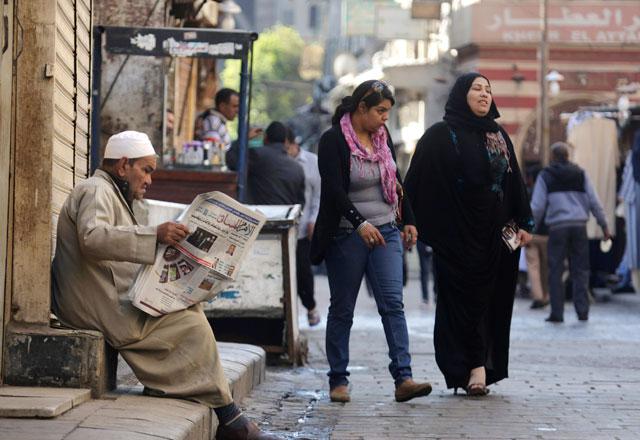You are here
Court quashes Morsi life sentence
By AFP - Nov 22,2016 - Last updated at Nov 22,2016

In this June 21, 2015 file photo, former Egyptian president Mohamed Morsi, wearing a red jumpsuit that designates he has been sentenced to death, raises his hands inside a defendants cage in a makeshift courtroom at the national police academy, in an eastern suburb of Cairo, Egypt (AP photo)
CAIRO — An Egyptian appeals court Tuesday quashed one of two life sentences handed down to Mohamed Morsi since his 2013 overthrow, in the Islamist ex-president's second appeals victory in a week.
The court of cassation, Egypt's highest appeals court, issued the verdict, Morsi's lawyer and a judicial official told AFP.
The court ordered a retrial in the case, Morsi's lawyer Abdel Moneim Abdel Maqsoud told AFP, adding: "The verdict was full of legal flaws."
The ruling quashed sentences against 22 others, including death sentences against the Muslim Brotherhood's deputy head Khairat Al Shater and other senior officials from the now banned group.
A court had sentenced Morsi to life in June 2015 on charges of spying for Iran, Hizbollah and the Palestinian Islamist movement Hamas.
The decision was the latest legal victory for the 65-year-old, who has been convicted and sentenced in all cases against him since being removed from office in 2013.
"Most of the trials in which the former president has been convicted are not built on sufficient evidence: the prosecutor relies on security services reports," University of Cairo political sciences Professor Mustafa Kamel Al Sayyed said.
Morsi was Egypt's first freely elected leader, taking power after the 2011 uprising that toppled long-time strongman Hosni Mubarak.
But his year in office proved deeply divisive and he was overthrown by then-army chief and now President Abdel Fattah Al Sisi following mass street protests.
A crackdown on Morsi's Muslim Brotherhood followed, with the movement blacklisted, hundreds of its supporters killed and thousands jailed or sentenced to death.
'Political' verdicts
The courts' handling of the cases against Morsi and his supporters, many of whom have been convicted after mass trials lasting just days, has drawn criticism from Western governments, human rights groups and the United Nations, which described the trials as "unprecedented".
Last week, the court of cassation also overturned a death sentence handed down against Morsi on charges of taking part in prison breaks and violence against police during the anti-Mubarak uprising.
Five co-defendants who also received death sentences, including Brotherhood supreme guide Mohamed Badie, are to be retried too in that case.
"These decisions tell us that the initial verdicts were political," said lawyer and human rights activist Gamal Eid.
From next Monday, the court is to start reviewing a second life sentence handed down against Morsi in a separate trial on charges of stealing documents relating to national security and handing them over to Qatar, a long-standing supporter of the Brotherhood.
"If the sentences had been upheld, I think that would have been a surprise — particularly the death sentence. Putting them aside isn't a surprise at all — it would have been their implementation that would have been," said H.A. Hellyer, senior non-resident fellow at the Atlantic Council.
"However, no one should assume that as a result of this, Morsi is being released," Hellyer added.
Divisive rule
Last month, the court of cassation upheld a 20-year jail sentence passed against Morsi on charges of ordering the use of deadly force against protesters during his year in power, which has become the only final verdict against the former Islamist president.
Morsi is being held at the Borg Al Arab prison near the northern city of Alexandria.
A veteran activist and engineering professor, Morsi emerged as a compromise candidate for the Brotherhood to field in Egypt's first democratic presidential election in 2012.
He narrowly won the vote but was soon accused of failing to represent all Egyptians and of trampling the ideals of the anti-Mubarak uprising.
His rule was marked by deep divisions in Egyptian society, a crippling economic crisis and often deadly opposition protests.
Morsi was removed by Sisi on July 3, 2013, after millions took to the streets demanding his resignation. Sisi became president a year later.
Morsi denounced a "coup" and his supporters insisted he was still the legitimate president.
Hundreds were killed in clashes that erupted when security forces dispersed two pro-Morsi protest camps in Cairo in August 2013.
The years following Morsi's overthrow saw a surge in bombings and shootings targeting security forces, particularly in the north of the Sinai Peninsula, a stronghold of the Daesh terror group.
The militants say the attacks are in retaliation for the crackdown on Islamists.
Related Articles
The office of Egypt's public prosecutor said Tuesday it will appeal a court decision to drop a murder charge against ex-president Hosni Mubarak over the deaths of protesters during the 2011 uprising.
President Abdel Fattah Al Sisi said Egypt will never return to the corrupt ways of the past, after a court dismissed murder charges against former leader Hosni Mubarak.
CAIRO — An Egyptian military court Tuesday sentenced Muslim Brotherhood leader Mohamed Badie to 10 years in prison over deadly clashes follo












